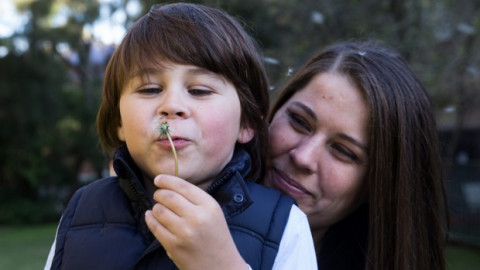
Like most parents, Alex Baltins wanted to find the best school for her son before he started kindergarten and made inquiries with a couple of schools near her home in Sydney's south.
"They sounded quite keen until I said my child has autism. Then it was like, 'Sorry, no'," she said. "I felt as if no one wanted my son."
A quality education experience for a student with disability is still likened to winning the lottery.
Children with Disability Australia
She tried a school with special needs classes but it could not accept Sebastian, now 5, as all places were full.
Sebastian ended up enrolling in a mainstream class at a local school which she describes as "incredibly supportive" but lacking the resources to adequately cater for her son's needs.
With the help of his therapist, she lobbied for additional support and an aide was provided for two hours a day to help Sebastian settle into his first year of school.
"Education is a basic human right," she said. "Families shouldn't have to fight to get it."
Sebastian's case is not isolated, according to multiple submissions before a senate inquiry into the treatment of children with disability in the education system.
Peak advocacy body Children with Disability Australia wrote: "A quality education experience for a student with disability is still likened to winning the lottery."
Its submission highlighted patchy funding for students with a disability, high rates of bullying, exclusion and abuse and cases of physical restraint which included children being tied up or locked in cupboards or cages.
"A typical school experience for students with disability involves discrimination, limited or no funding for support and resources, inadequately trained staff, a systemic culture of low expectations, exclusion and bullying," the submission noted.
"There are increasing incidents of restraint and seclusion reported to CDA, which are seen as a clear consequence of a system in crisis."
According to the submission, the current system is "failing to adequately meet the needs of students with disability", noting that many staff did not receive sufficient training to assist students with a disability.
"Another consequence of the lack of expertise within schools is the misidentification of behaviour support needs, with students frequently being viewed and treated as 'naughty.' Often, a disciplinary response to a student's behaviour support needs leads to use of punishment, including suspension and expulsion, rather than providing appropriate support."
The submission called for better data collection on students with a disability, particularly those being home schooled; nationally consistent funding and improved training for teachers, including ongoing learning and development.
It recommended the establishment of an independent complaints body and improved oversight on the use of restraints.
The Australian Education Union's submission also recommended improved teacher training and funding after finding 84 per cent of principals were forced to divert resources from other areas to support children with a disability.
Federal president of the AEU, Correna Haythorpe said: "We hope to see the Abbott Government implement the full disability loading to adequately educate these students and prepare them for work and life after they finish school."
About 90 per cent of children with a disability attend mainstream schools but only about one-third complete year 12.
The Education and Employment References Committee will hold a public hearing into the treatment of students with a disability in Sydney on September 18.